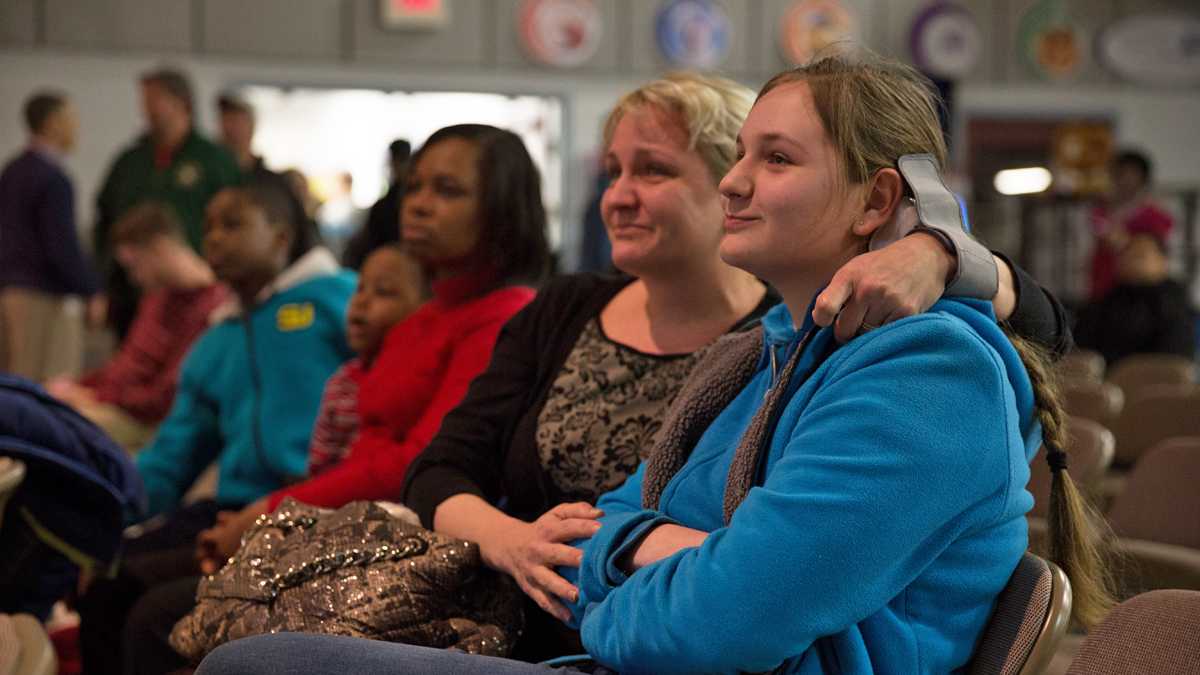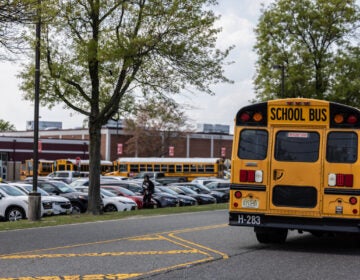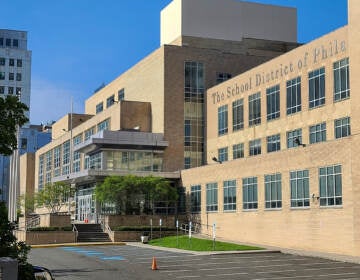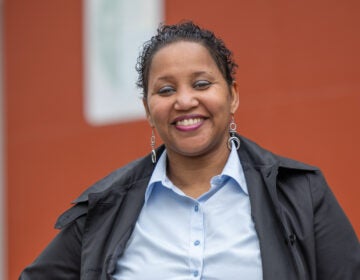PSP makes $10.5 million grant to five new charter schools

A mother becomes emotional as her daughter is named first on the 9th grade waiting list at MaST Community Charter School. (Lindsay Lazarski/WHYY)
The Philadelphia School Partnership will provide $10.5 million in startup grants to five new charter schools approved to open for the 2016-17 year.
PSP will provide $3.3 million to Mastery Charter Schools to open Gillespie, a K-6 campus in North Philadelphia which plans eventually to enroll 588 students – giving admissions preference to students living in the Simon Gratz catchment.
Students at Gillespie would naturally matriculate into Gratz, a grades 7-12 renaissance school run by Mastery.
Mastery says it now intends to postpone Gillespie’s opening until 2017-18. The charter is also pursuing operations of Germantown’s Wister Elementary through the renaissance process.
KIPP will receive $1.6 million to boost its opening of a new West Philadelphia elementary serving 375 students, offering a channel to an existing West Philly KIPP middle school.
Freire charter will get $1.9 million as it opens TECH Freire, a North Philadelphia-based high school serving 580 students with a focus on computer programming and entrepreneurship. TECH Freire is to give admissions preference to children living in the Strawberry Mansion catchment.
MaST will receive $1.9 million to open a new charter in lower Northeast Philadelphia that plans to grow to 1,250 students.
PSP will also give a $1.7 million grant to Independence Charter to open a new K-8 charter enrolling 900 students – giving preference to children who live in the West Philadelphia catchments of Sayre, Bartram and Overbrook high schools.
The School Reform Commission approved the opening of all of these schools, except KIPP’s, in February. KIPP’s bid was at first rejected, but approved in May after leaders amended their proposal.
PSP said the charters will use the funds to upgrade buildings, buy materials and supplies, as well as cover salary costs during the planning and startup processes.
“We’ve got five new schools opening, all run by proven operators, all going into neighborhoods where there is a real need,” said PSP executive director Mark Gleason.
Each of the approvals came in the midst of a heated ideological debate over expansion of the charter sector – fuelled, in part, by divided political pressures at the highest echelons of state government.
The Philadelphia School Partnership put itself at the center of that debate when it offered the district a $35 million grant to help offset the added, systemic costs of charter expansion.
In the end, counting KIPP’s later approval, the SRC approved six new agreements among the 40 applications it had received. Each green light came with a long list of added conditions, including shortening the pacts to three years instead of the typical five.
These are the first non-neighborhood-based charters the SRC has approved since 2007 when it instituted a moratorium on lottery-based schools. The SRC pivoted instead to the renaissance model, which calls on charter operators to assume responsibilities akin to neighborhood district schools while limiting the fiscal impact on the district’s bottom line.
A bipartisan coalition of state lawmakers forced the end of that moratorium with an amendment added to the legislation that authorized Philadelphia to hike its tax on cigarettes.
When the SRC approved the new charters, it argued that there would be limited fiscal impact, as the newly created seats would replace those of charters the SRC was in the process of closing.
Following that logic, the Philadelphia School Partnership withdrew its $35 million offer.
It’s not yet certain, though, that enough of those closures will occur before the start of next school year to offset the cost of the additional seats.
When it voted in February to approve Mastery’s bid to open Gillespie, the SRC included terms that said that if Mastery were granted a renaissance charter, it would forfeit the Gillespie agreement.
The clause was stripped in the final agreement both sides signed in May.
In addition to the $10.5 million allotment, PSP also announced a slate of smaller “incubation” grants to aid the applications of three of this year’s new charter applicants.
PSP will grant $79,000 to Folk-Arts Cultural-Treasures’ bid to open a second Chinatown charter. FACTS co-founder and city Councilwoman-elect Helen Gym has often criticized PSP’s influence on public school decisions, and says she currently opposes any charter expansion.
Russell Byers Charter School will receive $77,000 to support its application to open a grades 6-8 middle school.
Global Leadership Academy will get $35,000 in its quest to open a new high school. GLA also aims to assume control of West Philadelphia’s Huey Elementary through the renaissance initiative.
This year, 14 charters applied by the mid-November deadline. One, a LBGT-centered charter, has already withdrawn.
The SRC will vote on this year’s applications in February. Renaissance charter decisions will be made in January.
WHYY is your source for fact-based, in-depth journalism and information. As a nonprofit organization, we rely on financial support from readers like you. Please give today.





